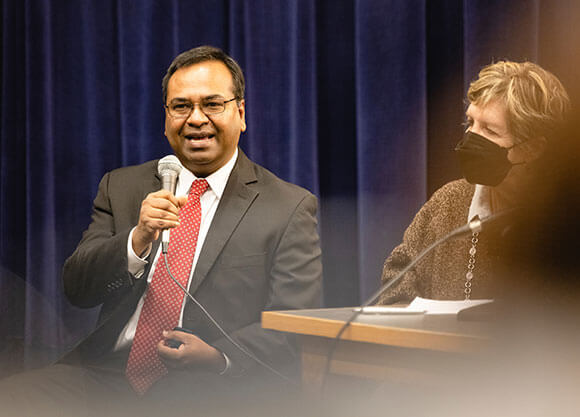
Faculty panel explores Russia’s invasion of Ukraine
March 02, 2022

March 02, 2022

Unpacking the motives behind the invasion is complicated, an expert panel of Quinnipiac professors agreed in a discussion moderated by Christopher Ball, Istvan Szechenyi Chair in international economics and director of the Central European Institute.
“President Putin told us many times in the last 15 years what his ideas are about creating Great Russia. He talks about Ukraine and Russian people as one people; this is the message for the domestic market,” said Novak Family Polish Chair Gedeon Werner. “He wants to establish spheres of failed states and wants to [ensure] no solid state on his border.”
The upcoming 2024 elections in Russia are undoubtedly a factor in Putin’s decision to invade Ukraine now, he said.
“He has to [perform] to a certain level to legitimize himself. He’s getting older, and if he wants to be a son of Russia, he’s running out of time,” said Werner.
Sean Duffy, executive director of the Albert Schweitzer Institute and professor of political science, framed his comments by invoking democratic peace theory.
“Democracies don’t want to go to war with one another,” he said. “This gives a lot of time for debate and for area of ideas and makes it difficult to jump to hasty kinds of actions. Economic connections create too much of a stake for conflict.”
Duffy reflected on the role of diplomacy in this situation, and how global reaction is much different than it might have been 50 years ago.
“In an example of public diplomacy, the Biden administration shared open-source intelligence to declare what Putin was doing to generate popular support against Russian’s invasion,” he said. “This inspired a rolling sanctions regime and countries as independent actors from oil companies.”
“The question is whether we’re seeing possibilities of a new infrastructure of peace. President Zelenskyy has asked for admission for Ukraine into the European community,” said Duffy. “I think this is going to be a defining moment for Ukraine and its population and could lead to incredible unity for a pro-Western democratic population.”
Control of the Ukrainian gas pipeline is another factor not to be overlooked in this conflict.
“Let’s not take our eyes off the ball: Per the recent alarming United Nations report on climate change, we’re running out of ways to deal with the environment,” said Duffy. “This could be an opportunity with the energy crisis that is about to hit Europe for a massive restructuring of the energy sector in Western Europe.”
Though it may be easy to feel helpless when confronted with media reports, it is important to remember that the press is “too primed to show us this type of conflict,” according to Duffy. Supporting alternative energy and other climate-sensitive initiatives is a more effective reaction than focusing on news stories and images, he suggested.
Associate Teaching Professor and Director of the Cybersecurity Program Frederick Scholl offered insight into the changing face of modern warfare.
“Ukraine has taught me to rethink the idea of a cyber Pearl Harbor. The real Pearl Harbor launched a world war, and that could happen within the cyberscape,” he said.
Scholl cited the 2017 Russian attacks on Ukrainian tax prep software as an example of cyber violence.
“Those weapons will leak out to other parts of the world, and more people could be brought into conflict, causing a constant loss of information,” he said.
Anat Biletzki, Schweitzer Professor of Philosophy and Women’s and Gender Studies, provided insight into the dangers of simplistic stereotypes of good versus evil in the socio-geopolitical arena.
“The [narrative] is very familial and familiar. It’s not poor Ukraine and strong Russia. We are likening Putin to the Nazis, but the Nazi’s greatest collaborators in competition with the Poles were the Ukrainians,” said Biletzki. “Making clear boundaries of identities is jumping into some sort of track.”
Bilitzki went on to explore that reason for concern around the invasion by onlooking countries may not be simply humanitarian concern.
“Where have we been with genocide with Ethiopia? Did we march and protest and talk? Does anybody know about it? What do we do with these complications,” she asked.
Professor of International Business Mohammad Elahee reflected on the resources that Urkaine offers — wheat in addition to energy, for example.
“Let’s notice how oil and gas are not under sanction. If we want to really punish Russia, we would have to take the economic pinch, but we don’t want it,” said Elahee. “This is somewhat problematic — and hypocritical.”
The panelists largely agreed that the conflict will most likely not cause a third world war, but that a complicated realignment of countries and power will result.
“There will be a reconfiguring of power, and this is going to be messy. It’s easy to say why we would invoke World War III, but this is dangerous and puts us into 20th century thinking. We need to not fall back on the idea of us versus them,” said Duffy.
The event was cosponsored by the Provost’s Series on Faculty Scholarship and Engagement and the Albert Schweitzer Institute.
Quinnipiac Today is your source for what's happening throughout #BobcatNation. Sign up for our weekly email newsletter to be among the first to know about news, events and members of our Bobcat family who are making a positive difference in our world.
Sign Up Now